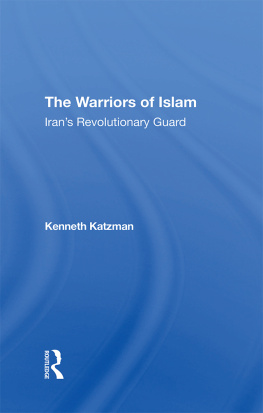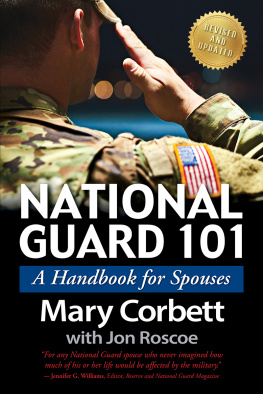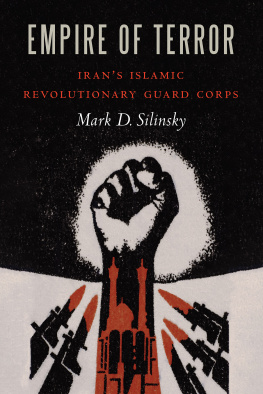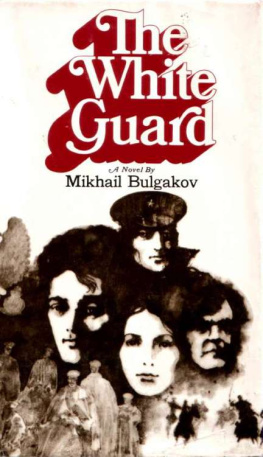First published 1993 by Westview Press, Inc.
Published 2019 by Routledge
52 Vanderbilt Avenue, New York, NY 10017
2 Park Square, Milton Park, Abingdon, Oxon OX14 4RN
Routledge is an imprint of the Taylor & Francis Group, an informa business
Copyright 1993 Taylor & Francis
All rights reserved. No part of this book may be reprinted or reproduced or utilised in any form or by any electronic, mechanical, or other means, now known or hereafter invented, including photocopying and recording, or in any information storage or retrieval system, without permission in writing from the publishers.
Notice:
Product or corporate names may be trademarks or registered trademarks, and are used only for identification and explanation without intent to infringe.
Library of Congress Cataloging-in-Publication Data
Katzman, Kenneth.
The warriors of Islam: Iran's Revolutionary Guard / Kenneth Katzman.
p. cm.
Includes bibliographical references and index.
ISBN 0-8133-7890-7
1. Sipah-i Pasdaran-i Ubqilab-i Islami (Iran) 2. IranHistory, Military. I. Title.
UA853.17K38 1993
356'.16'0955dc20 92-17902
CIP
ISBN 13: 978-0-367-29713-8 (hbk)
In Iran, the Islamic Revolutionary Guard Corps is everywhere. In the immediate post-revolutionary period, the Guard was a hastily gathered, disorganized, and ill-trained militia that helped Ayatollah Ruhollah Khomeini and his lieutenants solidify their hold on power in Tehran. During the eight-year war against Iraq, it also developed into an organized military, a monitor of popular conformity to Islamic law, and a key tool for the export of the Islamic revolution. In the Iran-Iraq war, it fought the war alongside Iran's regular armed forces, which were held over from the Shah's regime. Since the end of the Iran-Iraq conflict in 1988, the Guard has taken on a defensive military role and some civilian reconstruction duties as well.
The limited amount of research that has been done on the Guard thus far has tended to compare it to Iran's regular military. However, the Revolutionary Guard is far too unusual in its ideological outlook, method of operations, role functions in Iranian society and politics, and developmental history to conform easily to traditional approaches of politico-military analysis. Unlike Iran's regular military, the Guard is also a political force and thus must be analyzed more broadly. The regular military, reflecting its nationalist orientation forged under the Pahlavi dynasty, is generally apoliticalloyal to whatever regime is in power. This apolitical nature, in part, accounts for its ability to survive, albeit weakened and extensively monitored politically, under the Khomeini regime. The Guard, by contrast, sees involvement in politics as not only permissible, but as part of its mission to defend the Islamic revolutiona mission that is enshrined in the Constitution of the Islamic Republic.
The relationship between the Guard and the clerical leaders of the Islamic regime who helped organize the Guard is just one among many aspects of the Guard that need discussion if one is to understand this organization. Fortunately, much work has been done on civil-military relations at the theoretical and empirical level, and this research will be a useful tool for analyzing the Guard's relationship with the Islamic gov ernment, its involvement in political disputes among factions of the regime, and its rivalry with the regular military.
Much work in political science, history, and sociology has been done on the causes and processes of revolution. Far less attention has been paid to the process of post-revolution institution building and the mechanisms by which major social revolutions consolidate their grip on power. An even smaller body of work, most notably by Katharine Chorley, has examined the related issue of the development of revolutionary armed forces. It is this research on institution building and revolutionary armed forces as instruments of revolutionary consolidation that is most pertinent to an analysis of the Guard. This approach will involve useful comparisons between the Guard and other revolutionary armed forces, particularly the Soviet Red Army, the Chinese People's Liberation Army, and the French revolutionary army.
There are some basic problems in attempting to analyze the Revolutionary Guard, foremost among them the difficulty in obtaining information about it. Since the takeover of the U.S. Embassy in Tehran in 1979, there have been no diplomatic relations between the U.S. and Iran. Aside from the ongoing U.S.-Iran Claims Tribunal at the Hagues there has been little official contact between the two nations. US diplomats, therefore, have had little access to Iranian officials or the Iranian political process.
The nature of the Iranian political system also restricts the amount and type of information that can be obtained by journalists. Access to Iran by foreign journalists is controlled by the government, and often appears to vary according to the prevailing political climate in Tehran. Access has tended to be poorer when the radicals are driving policy than when more pragmatic elements have the upper hand politically.
A second major problem is the reliability of information on Iran. The Iranian regime is a divided one, and each faction has an interest in portraying its ideals, policies, leaders, and efforts in the best light possible. Information that can be gathered from inside Iran by journalists, therefore, has to be carefully evaluated or caveated in terms of the particular group, person, or faction that is providing the information.
The factionalism in the regime, however, also benefits researchers on Iran in that it tends to result in a greater availability of information. Just as each faction may tend to slant its view of events to benefit its own position, similarly, any one faction also has an interest in revealing information about a rival faction for the purpose of discrediting that competitor. In this process, information that would not otherwise be disclosed comes to light. An excellent example is provided by the revelations surrounding the 1986-87 "Mehdi Hashemi Affair." Mehdi Hashemi, a relative by marriage and aide to Ayatollah Hosein Ali Montazeri (who was forced out as Khomeini's designated successor in March 1989) was head of the "Office of Liberation Movements," originally a formal arm of the Revolutionary Guard
Outside the regime, a continuous stream of information is provided by Iranian exiles, some of whom have served under or support the former Shah's regime, others of whom once served in or supported the Islamic regime and have since broken with it. Examples of the latter include the first President of the Islamic Republic Abol Hassan Bani-Sadr, now in exile in France, and the voluble Mojahedin-e-Khalq (People's Warriors) Organization, based in Iraq. In general, it will not be possible to rely on these sources unless specific events or interpretations put forth by these exile sources can be independently confirmed. This caution would especially apply in using exile information to analyze affairs in which their organizations may be involved or would particularly benefit by adoption of their interpretation of events. Neither should exile reporting be rejected out of hand, however; it can often amplify or fill in gaps left by other reports and can contribute to the analysis of events and trends. Many exile reports about demonstrations or civil disturbances in Iran have been acknowledged, at least indirectly, by the Iranian government.











